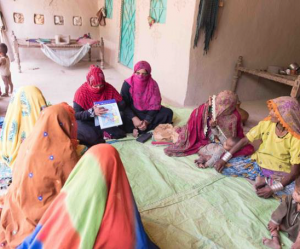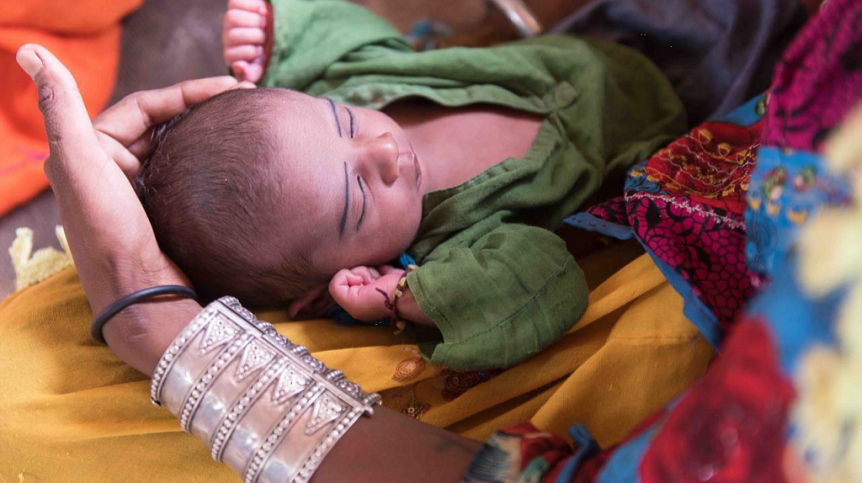Ram Bai, 27, is a mother of five from southeast Pakistan. Although she delivered her children safely, she nearly lost one child to an umbilical cord infection – an infection that could have been prevented.
Life in Yousfani Farm, where she lives and farms with her children and husband, Kirshan, is hard. The village in Sindh province is comprised of 60 households – about 500 people in all – and most are very poor. With the nearest health facility in Nasarpur – an eight-kilometer (five-mile) commute away along poor roads – health issues are largely dealt with at home using traditional methods.
Following the births of her first four children, Ram Bai cleaned the base of their umbilical cords with oil and surma (kohl) as she was taught by women in her community. However, her youngest child – a son named Mano – soon showed signs of an unhealthy reaction, his umbilical cord stump becoming swollen and infected. Her worst fears were realized when he developed neonatal sepsis, a very serious and potentially life threatening condition.
Fortunately, Shagufta Razzaque, an MCHIP-trained community health worker (CHW) from Yousfani Farm, heard about Mano’s health crisis and supplied Ram Bai with chlorhexidine antiseptic gel tubes and instructions on how to treat the baby’s infection. When applied to a newborn’s umbilical cord in high-risk settings, chlorexhidine antiseptic gel has been shown to reduce severe infection by 68% and newborn mortality by 23%, potentially saving over 300,000 lives globally.
For Ram Bai, who was pregnant with her fifth child at the time, learning about proper cord care was a potentially lifesaving intervention – it not only improved her young son’s health; it also allowed her to better prepare for a healthy next delivery. And for Shagufta, meeting Ram Bai opened her eyes to the larger community need for education on proper cord care.
As a result, the CHW helped form a monthly support group for about a dozen women from Yousfani Farm to improve their knowledge of maternal and newborn health. The topics discussed covered a wide range of critical issues for moms and babies – from the importance of both antenatal and postnatal care, to immunization, cord care, breastfeeding, and personal hygiene. And while the support groups were for women only, men were also sensitized to issues of maternal and newborn health through education sessions hosted by MCHIP-trained community mobilizers.

Above: Shagufta Razzaque, an MCHIP-trained CHW, holds a community support group meeting in the village of Yousfani Farm.
In Pakistan, one of the most dangerous places to be a newborn, MCHIP trained 3,000 skilled birth attendants and 13,000 CHWs and LHWs – including Shagufta – from 16 districts in Sindh to meet the health needs of women like Ram Bai and their families. These one-day trainings included lectures, role plays, and practice session on dolls. MCHIP also developed training manuals for both skilled birth attendants and CHWs, translating the latter into the local language, and distributed more than 600,000 chlorhexidine antiseptic gel tubes free of cost to families throughout the 16 intervention districts.
The Program’s work to improve maternal, newborn and child health services in the region quickly gathered steam, ultimately reaching thousands of women like Ram Bai, who found the support groups invaluable. For instance, becoming an active member of the group led Ram Bai to one-to-one counseling session with Shagufta during her pregnancy. And when she gave birth to her fifth baby at home and applied the chlorexhidine gel as instructed, she was relieved to see that the baby remained healthy and did not suffer from a cord infection or sepsis.
She then shared her positive experience with chlorhexidine with her support group, thereby spreading the effectiveness of one of Shagufta’s key health messages through the power of her own story. “I found the gel easy to apply,” she told her fellow group members. “The umbilical cord remained healthy and separated within seven days!”
As the follow-on project to MCHIP, USAID’s flagship Maternal Child Survival Program continues to help bring proven, cost-effective solutions like chlorexhidine antiseptic gel to communities that lack access to integrated healthcare. As the Program increases women’s authority to make health decisions for themselves and their children, we’re improving the health of entire families in some of the world’s neediest communities.
Qamar u Zaman Jamali
MCHIP/Save the Children, Newborn and Child Health Advisor, Pakistan
Irshad Ahmed
MCHIP/Save the Children, Senior Program Coordinator Newborn and child health, Pakistan
Younus Khan
MCHIP/Communication Specialist, Pakistan

